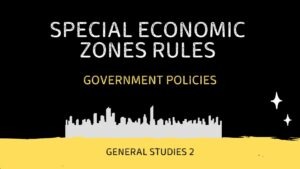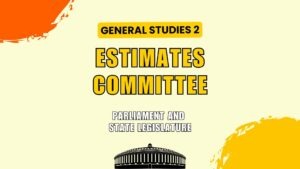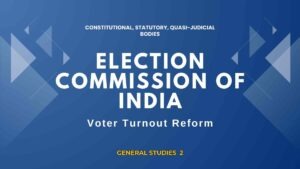Registered Unrecognised Political Parties - Important Notes for UPSC
Registered Unrecognised Political Parties
🧭 Context
The Election Commission of India (ECI) has initiated the delisting of 345 RUPPs that have not contested any elections since 2019 and are physically untraceable.
This move is aimed at curbing misuse of political privileges and improving transparency in the electoral process.
🗳️ What are Registered Unrecognised Political Parties?
| Criteria | Details |
|---|---|
| Legal Status | Registered under Section 29A of the Representation of the People Act (RPA), 1951 |
| Recognition | Not recognised as either National or State party by ECI |
| Number | Over 2,800 as of 2025 (Almost 97% of all registered political parties) |
| Growth | Increased from 1,112 (2010) → 2,301 (2019) → 2800+ (2025) |
| Privileges | ✅ Income Tax Exemptions (under Section 13A of the IT Act) ✅ Can receive political donations |
✅ Criteria for Recognition of Political Parties
A. State Party (Any one of the following):
6% Vote Share + 2 Assembly Seats
6% Vote Share in Lok Sabha + 1 Lok Sabha seat from that state
3% of Assembly Seats or Minimum 3 Seats
1 of every 25 Lok Sabha seats from that state
8% of Total Valid Votes in Assembly or Lok Sabha (even without winning any seat)
B. National Party (Any one of the following):
6% Valid Votes in 4 States + 4 Lok Sabha Seats
2% Lok Sabha Seats (i.e., 11 seats) from at least 3 States
Recognition as State Party in 4 States
⚠️ Issues with Registered Unrecognised Political Parties (RUPPs)
| Problem | Description |
|---|---|
| Electoral Inactivity | Many RUPPs haven’t contested elections for years. |
| Opaque Funding | Less than 5% submitted donation reports (2013–2016). |
| Tax Misuse | Use Section 13A of IT Act for exemption without active participation. |
| No Physical Existence | Many have no traceable offices, violating Section 29A norms. |
| Election-time Proliferation | Spike in registrations often linked to dubious funding routes. |
🔍 Institutional Response & Recommendations
✔️ Election Commission’s Action:
Delisting 345 dormant RUPPs in 2025.
Past delisting initiatives: 87 parties (2022), 284 parties (2023).
✔️ Recommendations for Reform:
Stricter Registration Criteria
Mandate minimum participation in elections within a time frame (e.g., 5 years).
Enforced Financial Transparency
Timely audit submissions, donation reports, PAN linkage.
IT & ECI Coordination
Joint audits to detect tax evasion and proxy donations.
Digital Tools for Oversight
Use of Political Parties Registration Tracking Management System (PPRTMS).
Public Disclosure of Compliance
State CEO websites to regularly update registration, audit filings, etc.
🔚 Conclusion
The cleanup of RUPPs is a much-needed step to:
Prevent money laundering and tax evasion via political outfits.
Enhance transparency, accountability, and democratic integrity.
Ensure that public privileges are not misused by inactive or proxy entities.
📖 Extra Info for Prelims:
Section 29A of RPA, 1951: Pertains to registration of political parties.
Section 13A of IT Act: Grants tax exemption to political parties subject to certain conditions.
ADR (Association for Democratic Reforms): A non-profit working on electoral transparency.
Mains-Based Questions on Registered Unrecognised Political Parties
Question 1
Q. What are Registered Unrecognised Political Parties (RUPPs)? Critically examine the issues associated with RUPPs and suggest institutional reforms to improve electoral transparency in India.
Answer Framework:
Introduction:
Define RUPPs: Registered under Section 29A of the RPA, 1951, but not recognised as National or State parties.
Mention context: Over 2,800 RUPPs exist; 97% of total parties; ECI delisted 345 dormant ones in 2025.
Body:
1. Issues with RUPPs:
Electoral Inactivity: Many haven’t contested elections in years.
Funding Opacity: Less than 5% filed donation reports (2013–2016).
Tax Exemption Misuse: Claim benefits under Section 13A of IT Act without electoral participation.
No Physical Presence: Violate RPA norms by lacking offices or functioning units.
Election-Time Proliferation: Rise in registrations linked to black money, benami funding.
2. Impacts on Electoral Democracy:
Misuse of public trust and state privileges.
Erodes financial accountability.
Dilutes the credibility of electoral rolls and political competition.
3. Institutional Reforms Suggested:
Periodic Delisting: Of inactive or non-compliant RUPPs.
Stricter Registration Norms: Mandate election participation within a fixed timeframe.
Mandatory Financial Disclosure: Enforce PAN-based donation tracking and audits.
Digital Tools: Use of PPRTMS for tracking real-time compliance.
Public Disclosure: State CEO websites to update status, financial filings.
Conclusion:
The clean-up of RUPPs is essential to uphold democratic integrity.
Strengthening laws and leveraging digital transparency tools is vital to prevent political misuse for tax evasion and money laundering.
Question 2
Q. Discuss the criteria for recognition of political parties in India. How does the lack of enforcement of these criteria affect the political ecosystem?
Answer Framework:
Introduction:
Recognition helps differentiate parties based on performance.
Mention ECI’s role and reference to criteria under Election Symbols (Reservation and Allotment) Order, 1968.
Body:
1. Recognition Criteria Overview:
State Party (any one):
6% vote + 2 Assembly seats
6% vote + 1 Lok Sabha seat
3% or 3 Assembly seats
1 Lok Sabha seat for every 25 seats
8% total valid votes
National Party (any one):
6% votes in 4 states + 4 Lok Sabha seats
2% of total Lok Sabha seats from 3 states
Recognised as State Party in 4 states
2. Importance of Recognition:
Symbol allotment, free airtime, office space, income tax exemption.
Reflects democratic legitimacy and electoral strength.
3. Problems from Poor Enforcement:
Proliferation of RUPPs with no electoral relevance.
Resource drain and cluttered ballot papers.
Weakens the credibility of the political system.
Encourages misuse of tax exemptions and opaque political funding.
Conclusion:
Recognition criteria must not only be clear but also enforced stringently.
Stronger ECI oversight, regular audits, and penalties for non-compliance are key to a cleaner electoral framework.
Question 3
Q. Evaluate the steps taken by the Election Commission of India to regulate the functioning of RUPPs. What more can be done to ensure transparency and accountability in the registration and operation of political parties in India?
Answer Framework:
Introduction:
Briefly mention the significance of ECI as a constitutional body regulating elections and political parties.
Body:
1. ECI’s Recent Steps:
Delisting of 345 dormant RUPPs in 2025.
Past delistings (87 in 2022, 284 in 2023).
Launch of Political Parties Registration Tracking Management System (PPRTMS).
Coordination with Income Tax Dept for financial compliance.
2. Limitations of Current Measures:
Still large numbers of inactive parties.
Low compliance with donation and audit norms.
Loopholes in tax law (Section 13A of IT Act).
3. Additional Reforms Needed:
Time-Bound Compliance: Cancel registration if parties fail to contest elections in 5 years.
Mandatory Office & Contact Verification at regular intervals.
Donation Reporting Threshold: Bring lower threshold for anonymous donations (currently ₹20,000).
Link Funding to Electoral Participation: Disallow tax exemption for non-participating parties.
Public Access Portals: Real-time tracking of party activities and compliance reports.
Conclusion:
Strengthening institutional regulation of RUPPs is essential for electoral integrity.
The ECI must be empowered with greater authority and digital tools to clean up the party system.
Prelims Questions based on Registered Unrecognised Political Parties
-
Special Economic Zones Rules – Important UPSC Notes
The Government of India has recently relaxed certain provisions of... -
National Conference of Estimates Committees – Important UPSC Notes
Lok Sabha Speaker inaugurated the National Conference of Estimates Committees... -
Election Commission of India – Important UPSC Notes
The Election Commission of India (ECI) has launched a tech-driven... -
Banakacherla Reservoir Project – Important UPSC Notes
A fresh inter-state water dispute has arisen between Andhra Pradesh... -
India-Japan Maritime Relation – Important UPSC Notes
India and Japan have intensified bilateral maritime collaboration (India-Japan Maritime... -
UNESCO Global Education Monitoring (GEM) Report
The UNESCO Global Education Monitoring (GEM) Report 2024–25 highlights that... -
Registered Unrecognised Political Parties – Important UPSC Notes
The Election Commission of India (ECI) has initiated the delisting... -
Viksit Bharat Ka Amrit Kaal Report – Important UPSC Notes
Viksit Bharat Ka Amrit Kaal Report - Important Notes for...









